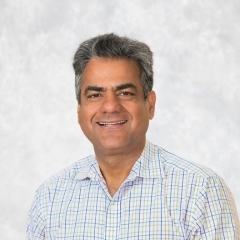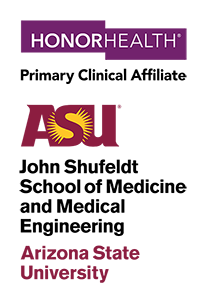Gastroenterology Fellowship Program at HonorHealth Four Peaks Medical Center
HonorHealth Four Peaks Medical center is formerly known as HonorHealth Mountain Vista Medical Center.
HonorHealth Four Peaks Medical Center is a 178-bed community-based hospital located in Mesa, Arizona and serves a diverse population from a large catchment area. The HonorHealth Four Peaks Gastroenterology Fellowship is a three-year program accredited by the ACGME. Successful completion of an internal medicine residency program is required to be eligible to apply for the fellowship program.
The HHFPMC serves as the primary training site for fellows. Fellows get both inpatient and outpatient experience under the guidance of faculty mentors. Hepatology services are a special focus and patients with diverse liver diseases are evaluated, treated and referred for liver transplantation from the clinic and hospital. The fellowship program also has a focused interest on patients with Disorder of Brain Gut Interaction (DBGI) and we collaborate with nutritionists, psychologists, physical therapists and other related medical professionals.
Program Aims
- The aim of our program is to train outstanding clinicians and endoscopists who will acquire the knowledge and skills of gastroenterology at the bedside while they provide empathetic and evidence-based care to their patients.
- Our program focuses on clinical, psychological, demographic and social determinants of diseases to enable our trainees to provide holistic care to their patients.
- Fellows receive experiences in medical treatment of patients and are supervised in performing safe and efficient endoscopic procedures to achieve their training goals.
Didactics
Fellows participate in didactics on Tuesday from 7-8:30 a.m. and Thursday from 7-8 a.m. of each week. Journal club, case presentations, morbidity and mortality, research, basic science and clinical topics are discussed in didactics. The Chief Fellow(s) under the guidance of the Program Director and faculty create the schedule for didactics.
Pathology and radiology conferences are held once each month. During the clinic rotations, fellows are expected to see interesting pathology and radiology cases with the specialists as needed. We believe that academic medicine requires attention to minute details and by frequently reviewing slides and imaging better quality of care is provided and educational experiences are enhanced.
Research
Fellows have one-month of research time each year. During the research rotation, fellows participate in two half-day clinics/week. The first year GI fellows are expected to complete a research proposal and IRB approval for the project. Fellows start collecting data and are expected to complete data collection in the second research rotation. All fellows are expected to present their study in a national conference and publish them in a peer review journal in their third year. Fellows report to their mentors during the research month and throughout the year about the progress of their research project.

